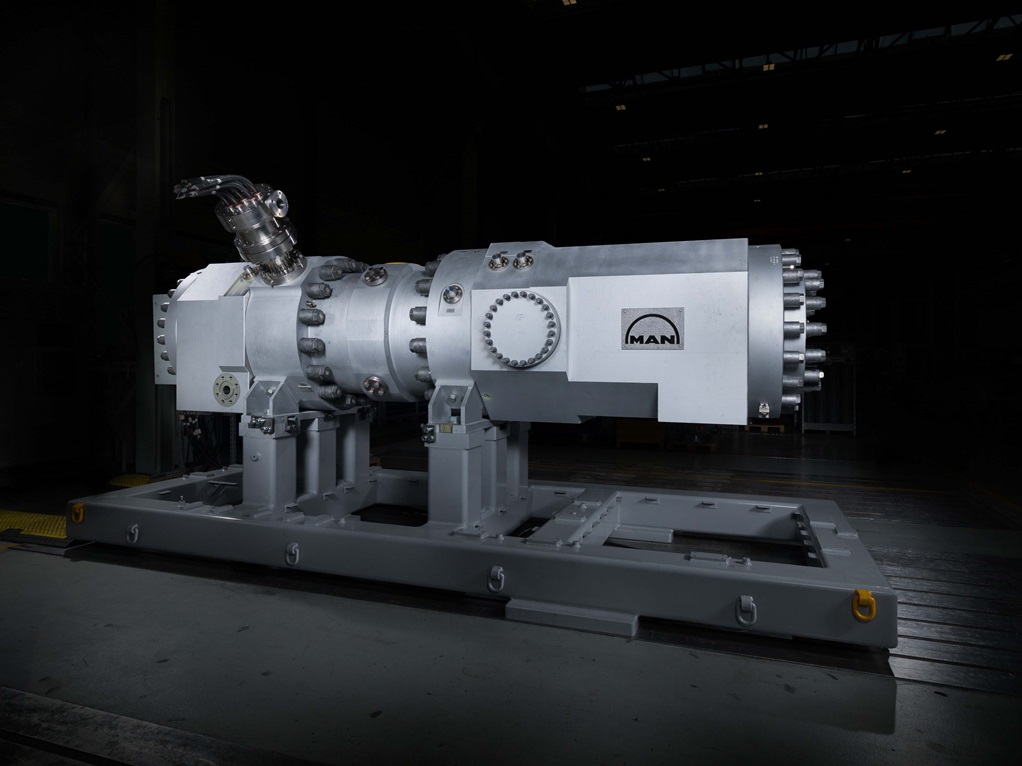Finland’s capital city to reduce CO2 emissions by 26,000 tons annually with MAN heat pump technology Mega heat pump to harness ambient air and renewable electricity for heat generation MAN Energy Solutions to deliver a 33 MW air-to-water heat pump unit – the world’s largest ever used for a district-heating plant
Finnish energy company Helen Oy has commissioned MAN Energy Solutions to supply an air-to-water heat pump as part of its Patola heating plant complex in Helsinki. The new heating plant, which includes the industrial-scale heat pump and two 50 MW electric boilers, is projected to reduce CO2 emissions by a total of 56,000 tons.
The air-to-water heat pump plant will be the largest in the world, with a full heating production capacity ranging from 20 to 33 MW, depending on the air temperature. The unit can operate at outdoor temperatures as low as -20° Celsius, using CO2 as the natural refrigerant in a closed loop system. Powered by electricity from renewable-energy sources, the heat pump will utilize ambient air as a thermal energy source to increase the water temperature and meet the requirements of the district heating network. Annually, it will supply around 200 GWh of heat to around 30,000 households in Helsinki, reducing CO2 emissions by 26,000 tons.
Uwe Lauber, CEO of MAN Energy Solutions, said: “We are very proud to support Helen in their efforts to achieve carbon neutrality in Helsinki. Our heat pump technology provides an economically competitive and efficient way to harness climate-neutral heat from ambient air, even at cold temperatures of -20° Celsius. Urban district heating projects that utilize climate-neutral technologies, are essential for advancing global efforts to reduce carbon emissions. We are excited to see our heat pump solution play a key role in driving the energy transition forward.”
Juhani Aaltonen, VP, Green Investments at Helen, stated: “Helsinki has set the ambitious goal to become carbon neutral by 2030, and transitioning our heating system is crucial to achieving this. Once completed, the heat pump plant will significantly reduce the CO2 emissions caused by heating, bringing us closer to our net-zero target. In addition, the new plant is likely to create price stability for customers, as its production is easily adjustable.”
The Finnish Ministry of Economic Affairs and Employment has granted Helen an energy subsidy for the large-scale heat pump plant, recognizing the technology’s significant contribution to reducing CO2 emissions. The plant is expected to start production during the heating season of 2026-2027.
The basic principle of heat pump technology involves using electrical energy to raise low-temperature thermal energy to a higher, usable level. A standout feature of MAN’s solution is its use of toxicologically- and environmentally-safe CO2 as a refrigerant for the entire system-cycle, which allows to deliver heat at temperatures of up to 90°C. Additionally, the solution enables rapid power-balancing of the electrical grid, supporting the integration of intermittent power generation like solar and wind.
The heart of Patola’s heat pump system is an oil-free, hermetically-sealed HOFIM® motor-compressor, which will be manufactured and tested by MAN Energy Solutions in Zurich, Switzerland. The compression unit utilises a high-speed motor and active magnetic bearings, enabling it to operate without requiring a dry gas seal system and the complete oil system.




Recent Posts
ClassNK Advocates Speed Gap Monitoring to Optimize Fuel Efficiency in Heavy Weather
Wärtsilä’s retrofit package for the Corsica Linea ferry Pascal Paoli has resulted in fuel savings of up to 22 percent Corsica Linea
COSCO Shipping Names Second Methanol Dual-Fuel Containership in Yangzhou
Sallaum Lines Takes Delivery of LNG-Powered Car Carrier Ahead of Schedule
UK Government Allocates £30 Million to Advance Clean Maritime Technologies and Support Coastal Communities
Final Indigenous Pollution Control Vessel ‘Samudra Prachet’ Launched by Goa Shipyard for Indian Coast Guard
TSUNEISHI Launches World’s First Methanol Dual-Fuel KAMSARMAX Bulk Carrier in the Philippines
Grimaldi Group Launches Ammonia-Ready Car Carrier Grande Shanghai in China